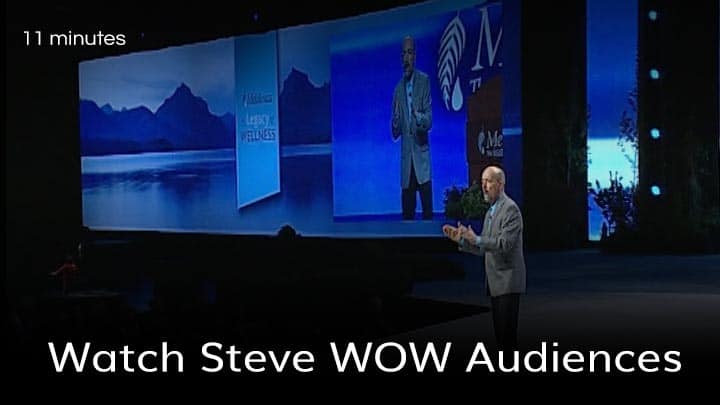Blog
Negative Self-Talk in Business
Beware of The Big Mouth Inside Your Head: How Negative Self-Talk Sabotages Your Business Success
In the high-stakes world of business leadership, success isn’t just about strategy, execution, or even talent. There’s an invisible force that determines whether you’ll seize opportunities or sabotage them before they even begin. I call negative self-talk in business “The Big Mouth inside your head”—and it’s quietly destroying your potential right now.
Negative Self-Talk in Business: The Hidden Enemy in the Boardroom
Back in 1992, I was backstage at the Sands Hotel in Atlantic City, preparing for my SHOWTIME comedy special. When Woody Harrelson asked how I wanted to be introduced, I grinned and told him to announce someone who was voted “Least Likely to Succeed” in high school—now filming a national television special.
That toxic label had followed me for years. And here’s the uncomfortable truth: we all carry these labels into our corner offices, strategy meetings, and leadership decisions.
As a Hall of Fame keynote speaker who’s worked with organizations from the CIA to American Express to Marriott Hotels, I’ve witnessed how this internal dialogue cripples even the most talented executives. The Big Mouth—what many call the ego, the inner critic, or negative self-talk—never stops talking. And if you listen to it, your career and business will pay the price.
Understanding Your Internal Saboteur: What Is the Big Mouth?
The Big Mouth is that relentless voice inside your head that operates from fear. It’s the internal dialogue that tells you:
- “What if this product launch fails?”
- “I don’t have what it takes to lead this merger.”
- “I’ll probably lose this client to the competition.”
- “I knew this partnership wouldn’t work out.”
- “I’ll never build a company culture as strong as our competitors.”
These aren’t random worries—they’re fear-based beliefs rooted in your past experiences. The Big Mouth is cunningly effective at keeping toxic beliefs alive, forcing you to remember past disappointments and failures so that when new opportunities arise, those destructive memories attack like emotional piranhas, devouring your chances for success.
In the business world, this voice manifests as analysis paralysis, playing it safe when you should innovate, micromanaging when you should delegate, or avoiding crucial conversations that could transform your organization.
How Toxic Labels Shape Your Business Leadership
The Big Mouth’s primary mission is simple but devastating: keep your limiting beliefs alive and operational. It creates compelling narratives that convince you that you cannot achieve the success you desire. This internal voice thrives on negative energy and operates from a database filled with unconscious thoughts and beliefs that distort your business reality.
When I was in eighth grade, a guidance counselor who didn’t know me spent thirty minutes reviewing test scores and proclaimed I didn’t have what it takes for college. He never asked about my dreams or aspirations. My parents and I accepted his “expert” opinion as truth.
That moment—sitting in his office, feeling ashamed and devastated at age fourteen—became a defining aspect of my young life. It confirmed the low opinion I already had of myself. Sound familiar? In business, these moments come from failed ventures, harsh feedback from superiors, or watching competitors succeed where you struggled.
The corporate equivalent happens daily in companies worldwide. A manager receives critical feedback and internalizes it as “I’m not leadership material.” An entrepreneur faces a failed product launch and concludes “I’m not cut out for this.” A salesperson loses a major account and decides “I’ll never close the big deals.”
The Business Cost of Listening to Your Big Mouth
Here’s what’s particularly insidious about the Big Mouth in a business context: it helps you rationalize why your career or company isn’t working. You blame market conditions, your team, the economy, or bad timing—anything beyond your control.
When I left teaching to pursue stand-up comedy, I was successful by external measures—headlining clubs, theaters, and colleges nationwide. But I was living a lie. I wasn’t the confident person I appeared to be. When opportunities arose to perform for industry executives, agents, and casting directors who could advance my career, I panicked and made excuses.
Rather than establishing myself in New York or Los Angeles where talent was discovered, I chose to tour as a headliner—a big fish in a small pond. The Big Mouth convinced me it was safer this way. I didn’t realize that I was the reason I never got my “big break.” My choices, driven by fear-based beliefs, determined my outcomes.
This pattern repeats in boardrooms everywhere. Talented professionals avoid pursuing promotions, entrepreneurs refuse to scale their businesses, and executives make conservative decisions that protect them from potential criticism rather than bold moves that could transform their organizations.
Negative Self-Talk in Business: The Negative Impact on Corporate Performance
When past experiences impinge upon your present decision-making, crippling emotions like fear, anger, resentment, and worry consume your leadership effectiveness. These “Destroyers of the Spirit” knock the life out of innovative thinking and strategic risk-taking.
In business, this manifests as:
Strategic paralysis: Overthinking decisions until opportunities pass Risk aversion: Choosing safe options over growth opportunities Imposter syndrome: Feeling unworthy despite qualifications and achievements Perfectionism: Delaying launches and initiatives indefinitely Delegation failure: Micromanaging because you don’t trust your judgment in hiring Relationship problems: Difficulty building authentic partnerships and teams
The symptoms are clear: “If only I had…” “I should have…” “I can’t…” “Here we go again.” “Nobody respects my vision.” “I never get the resources I need.” “My leadership team doesn’t support me.”
Guess what? The Big Mouth is at work.
Awareness: The First Step to Business Breakthrough
The first critical step to freeing yourself from this internal saboteur is simply becoming aware of it. That’s right—just awareness. I call it the key that will set you free.
Breaking old beliefs and habits depends on recognizing them as barriers to success. Simply by becoming aware that you’re creating these obstacles, you open your mind to other possibilities. When you notice you’re feeling anxious about a presentation or doubtful about a business decision and recognize that the deceptive voice is responsible, you become the observer. You simultaneously shift to a higher perspective where you’re less affected by the negativity.
Think of it this way: The Big Mouth leads you to your shadow self, where fear and self-doubt reside. Awareness connects you to your higher self, where you can choose from infinite possibilities for how to respond.
When I finally investigated the causes of my unhappiness and career stagnation, I realized my toxic labels and the Big Mouth were the primary culprits. Until then, I was unaware that past experiences dictated so many present choices. This realization became a genuine wake-up call.
That awareness gradually pulled me away from negative thinking patterns. Every time I observed the rampage of negative thoughts controlling my decisions, I simultaneously caught a glimpse of my true capability. This constant awareness eventually sets you free because it’s a higher state of consciousness that exists only in the present moment—where the Big Mouth, which draws strength from fear-based past beliefs, has no real power.
Negative Self-Talk in Business: Applying Common Sense and Humor to Business Challenges
Once you’re aware of the Big Mouth, your next mission is stopping those negative emotions before they blossom into full-blown decision paralysis or self-sabotage. This might seem impossible, but it’s very achievable.
Here’s the strategy: shift into a mode of common sense, humor, or both.
When you recognize the Big Mouth is pulling your strings, challenge it with straightforward questions that tap into your rational mind:
- “What are the actual chances of this worst-case scenario happening?”
- “Does repeatedly running through negative possibilities help me make better decisions?”
- “What’s a more constructive way to view this situation?”
- “What will the consequences be if I hold onto this fear instead of taking strategic action?”
These common-sense questions act as both brake and buffer, disassociating you from negativity and putting you in a more reasonable, strategic state of mind.
Humor is equally powerful. Years ago, I rewrote my eighth-grade counselor experience in my imagination. In my revised version, I stood up and told him exactly what my future would hold—teaching with honors, a 25-year comedy career, television specials, becoming a Hall of Fame speaker, writing best-selling books, and founding Laugh It Off Productions.
This imaginative rewrite empowered me to leave that nightmare behind. It gave me the satisfaction of an “aha moment” and robbed that experience of its power over my present decisions.
In business, this looks like reframing a failed product launch as valuable market research, viewing a lost client as an opportunity to refine your offering, or seeing a missed promotion as a signal to develop new skills or explore different opportunities.
Breaking Free: Practical Steps for Business Leaders
Here’s the bottom line for business leaders and entrepreneurs: toxic labels from your past ruin your present performance, and the Big Mouth gives those labels momentum. You cannot lead effectively, innovate boldly, or build successful organizations if your toxic past follows you everywhere, dictating who to be, what to do, and how to do it.
The question isn’t whether you’ve experienced setbacks, criticism, or failures. Every successful business leader has. The question is whether you’ll use those experiences as excuses for playing small or as lessons that strengthen your leadership.
Maybe you experienced a business failure that left you risk-averse. Perhaps you had a boss who constantly criticized you, making you doubt your judgment. Maybe you grew up in an environment where anger and fear were normal responses to challenges, and you’ve brought those patterns into your leadership style.
Whatever your past experiences, stop using them as validation for your limitations. Choose to break free now.
Our past struggles—no matter how severe—are irrelevant to our present potential. It defies logic to hold onto emotional baggage from past failures when making decisions today. In fact, past struggles can be our greatest assets if we learn from them and move forward with wisdom rather than fear.
The Competitive Advantage of Mindset Mastery
In my work with companies ranging from Fortune 500 corporations to emerging startups, I’ve seen one pattern consistently: leaders who master their mindset outperform those with superior technical skills but limiting beliefs.
Your mindset—the collection of thoughts, beliefs, feelings, and attitudes that shape how you view your business, your industry, and yourself—influences how you behave and determines the actions you take. Those actions always lead to particular outcomes. In other words, your mindset writes the story of your business success or failure.
When your desire to shift to higher thoughts and feelings of confidence, clarity, and strategic thinking becomes paramount, awareness comes more quickly and frequently. Your ability to shift to common sense and humor strengthens. The result: your identification with the Big Mouth ceases, and negative beliefs about yourself and your business potential gradually change.
Negative Self-Talk in Business: Your Choice: Control or Be Controlled
It comes down to this fundamental choice: Do you want to live and lead from a higher state of consciousness in the present? Do you want beliefs that empower your business decisions? Or do you want to be controlled by unconscious fears from your past?
Negative thoughts and emotions are like uninvited board members who refuse to leave and constantly vote against your best interests. Every time you become aware of them and refuse to let them influence your decisions, you build confidence in yourself. You’re victorious in keeping the Big Mouth at bay.
Most importantly, step by step, a new you—and a new level of business performance—begins to emerge. The key is maintaining awareness consistently. When you’re in a state of awareness and become the observer, higher thoughts prosper while toxic patterns slowly dissipate.
Transform Your Business by Transforming Your Inner Dialogue
The voice inside your head will always be there. The Big Mouth is simply feedback—a collection of negative experiences and limiting beliefs that accumulate over time. But you don’t have to listen. You don’t have to let it write the story of your business life.
Throughout my career—from being voted “Least Likely to Succeed” to performing in my SHOWTIME special, to being inducted into the Speaker Hall of Fame in 2006, to shifting mindsets across the globe—I’ve learned one fundamental truth: your external business success begins with your internal dialogue.
When you master awareness, employ common sense, and use humor to defuse limiting beliefs, you unlock your true potential as a business leader. You make bolder decisions, take calculated risks, build stronger teams, and create the business outcomes you’ve always known were possible.
The Big Mouth will tell you to play it safe, avoid the risk, and stick with what’s comfortable. Your higher self—accessed through awareness—knows better. It knows you’re capable of far more than your past suggests.
The question is: which voice will you listen to?
About Steve Rizzo: A Hall of Fame Speaker and former national headline comedian, Steve Rizzo captivates audiences worldwide as he reveals the secrets of shifting mindsets from failure to success, from unhappiness to fulfillment, and from “Woe is me” to “Wow is me!” As a funny keynote speaker, His common-sense success strategies have transformed organizations from the CIA to American Express to Marriott Hotels. Learn more at steverizzo.com.


